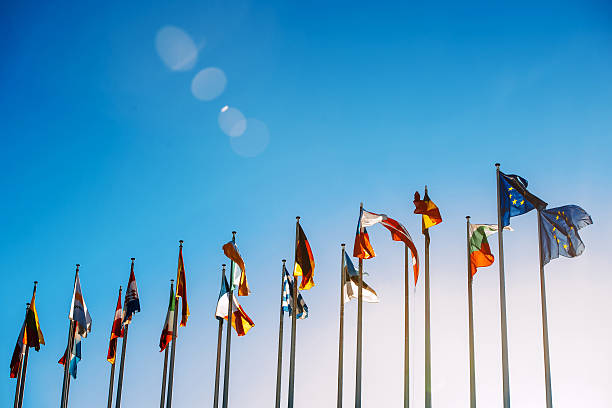Diplomacy is a term that is often used and heard in the context of international relations, but what does it mean exactly? How is it practiced and conducted? What are its types and features? Why is it important and relevant for our lives and the future of humanity? In this blog, we will answer these questions and more, and provide you with a brief and clear overview of the concept and practice of diplomacy.
Meaning & Definitions- What is Diplomacy?
Diplomacy is the process and practice of communication and negotiation between actors in the international system, with the aim of achieving their goals and resolving their conflicts and disputes. Diplomacy involves the use of various methods and tools, such as dialogue, persuasion, compromise, and coercion, to influence and shape the behavior and outcomes of other actors.
Diplomacy definition can vary depending on the perspective and approach of the scholar or practitioner, but one common and widely accepted definition is: “Diplomacy is the management of international relations by negotiation; the method by which these relations are adjusted and managed by ambassadors and envoys; the business or art of the diplomatist.”
History of Diplomacy
Diplomacy has a long and rich history, and it has evolved and changed over time, along with the development and transformation of the international system and the actors in it. The history of diplomacy can be traced back to the ancient times, when the first civilizations and empires emerged and interacted with each other, and when the first forms of diplomacy, such as envoys, treaties, and alliances, were practiced.
Diplomacy also developed and diversified in the medieval and modern times, when the rise and fall of various states and empires, the emergence and spread of various religions and ideologies, and the discovery and colonization of various regions and continents, shaped and reshaped the international system and the actors in it.
Types of Diplomacy
Diplomacy is not monolithic or homogeneous, but rather diverse and complex, and it can be classified and analyzed in different ways. One common way is to divide it into two broad categories: traditional and modern.
Traditional diplomacy is the type of diplomacy that is based on the formal and official relations between states, and that is conducted by the professional and accredited representatives of the states, such as diplomats and ambassadors.
Modern diplomacy is the type of diplomacy that is based on the informal and unofficial relations between various actors, such as non-state actors, civil society, and the public, and that is conducted by the various agents and channels, such as NGOs, media, and celebrities.
Another type of diplomacy is international diplomacy which refers to the negotiations and interactions between states and other actors on the global stage, aimed at achieving specific goals and advancing national interests.
Features of Diplomacy
Diplomacy has some distinctive features that make it different from other types of communication and negotiation. Some of these features are:
– Bilateral: Diplomacy is usually bilateral, meaning that it involves two actors or parties, and that it aims to establish and maintain a mutual and reciprocal relationship between them.
– Multilateral: Diplomacy can also be multilateral, meaning that it involves more than two actors or parties, and that it aims to create and sustain a collective and cooperative relationship among them.
– Continuous: Diplomacy is continuous, meaning that it is not a one-time or occasional event, but rather a long-term and ongoing process, and that it requires constant and consistent engagement and interaction between the actors or parties.
– Flexible: Diplomacy is flexible, meaning that it is not rigid or fixed, but rather adaptable and adjustable, and that it can change and modify its methods and tools, depending on the situation and the actor or party.
Importance of Diplomacy
Diplomacy is important and relevant for our lives and the future of humanity, as it affects and is affected by the various issues and topics that we face and deal with in the global arena, such as security, trade, human rights, development, and environmental protection.
Diplomacy also enables and facilitates the communication and cooperation between actors in the international system, and helps to prevent and resolve the conflicts and disputes that arise among them. Diplomacy also shapes and influences the world order and the global governance that we live in and aspire for.
India’s Diplomacy & its Features
India’s diplomacy is the reflection and expression of its interests, values, and aspirations, and it guides its relations and interactions with other actors in the global arena. India’s diplomacy has some distinctive features that make it unique and remarkable. Some of these features are:
– Non-alignment: India’s diplomacy is based on the principle of non-alignment, meaning that India does not align itself with any major power bloc or alliance, and that it maintains its autonomy and independence in its foreign policy decisions and actions.
– South-South cooperation: India’s diplomacy is based on the principle of South-South cooperation, meaning that India promotes and participates in the cooperation and solidarity among the developing countries, and that it supports and assists them in their economic and social development.
– Multilateralism: India’s diplomacy is based on the principle of multilateralism, meaning that India engages and cooperates with various regional and international organizations and forums, and that it contributes and adheres to the international law and norms.
Conclusion
In conclusion, diplomacy is an indispensable tool in international relations, allowing nations to communicate, negotiate, and cooperate with one another. Through diplomacy, nations can resolve conflicts, promote their interests, and work together to address global challenges.
As the world becomes increasingly interconnected, the importance of diplomacy in international relations will only continue to grow. Whether it is through traditional means, such as embassies and ambassadors, or modern forms, such as social media and NGOs, diplomacy in international relations remains a crucial component.
The various functions of diplomacy, including communication, negotiation, and mediation, help nations navigate complex issues and find solutions that benefit all parties involved. Ultimately, understanding what is diplomacy in international relations is essential for building strong, effective relationships between nations and fostering a more peaceful and prosperous world.




